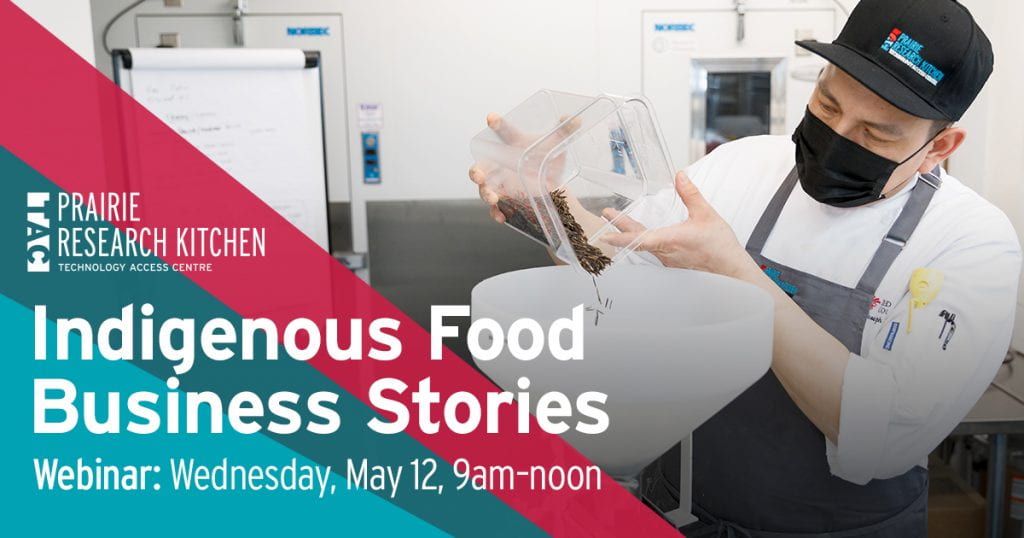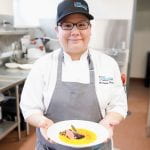Community through cuisine: Red River College’s Prairie Research Kitchen hosts Indigenous food business stories webinar
Food and story-telling has always brought people together. The Prairie Research Kitchen is creating a community environment for Indigenous stories and food science to blend and grow. On May 12 from 9 am – 12 pm, the Prairie Research Kitchen will host an Indigenous Food Business Stories webinar to foster discussion and relationship building in the food entrepreneur community.
Community and economic development representatives, aspiring researchers, and entrepreneurs are invited to this discussion on food product development stories from Indigenous business leaders and to learn how the Prairie Research Kitchen can help as a product development resource. Participants will hear stories and lessons learned from Indigenous food entrepreneurs who have been through similar journeys. There will also be an opportunity to hear about exciting food business opportunities across Turtle Island (North America) from Andi Murphy of Toasted Sister, a podcast focused on Indigenous food and entrepreneurship.
The Prairie Research Kitchen at Red River College is a Technology Access Centre available to all food businesses and entrepreneurs who want to engage in food related applied research and product development. The team of food scientists and culinary experts work with companies to create new, safe food products for sale. These products can be consumer packaged goods, ingredients or extracts to be used by other food producers, or ingredients or foods used by food service businesses.
In 2020, the Prairie Research Kitchen began outreach to Indigenous communities and entrepreneurs to encourage and support the development of food ventures. Outreach activities are part of the College’s commitment to support the Truth and Reconciliation Commission’s Calls to Action with respect to eliminating educational and employment gaps between Indigenous and non-Indigenous Canadians.
“The Truth and Reconciliation Commission of Canada’s Calls to Action call upon every industry and person in Canada to create the changes required for reconciliation, equitable opportunities for access and growth, and to further the conversation. As a Technology Access Centre, we are uniquely positioned to support and offer opportunities and resources to Indigenous food entrepreneurs,” says Mavis McRae, Director Prairie Research Kitchen Technology Access Centre. “Bringing these entrepreneurs and experts together will create a launch pad for further discussions, create relationships that blend state-of-the-art food science and Indigenous knowledge, and will help us get the word out that we are here and what we can do.”
McRae also says this is just the beginning and there are many stages in food product development to discuss through an Indigenous lens such as business growth, ingredients, recipe development, packaging, and distribution. McRae will share more on these opportunities with attendees at the webinar, which will also feature a welcoming from RRC Elder-in-Residence Elder Una Swan and presenters from the National Research Council of Canada’s Industrial Research Assistance Program.
Indigenous Food Business Stories featured speakers:
Welcoming and Scaling up a Family Recipe
Elder Una Swan, Cree Ware Owner
RRC Elder-in-Residence Una Swan is a band member of Fisher River Cree Nation. She is 53-years-old and has three boys and one grandson. She says she is very close to her culture, both from a physical and spiritual aspect. She has worked at various grassroots organizations over the past 20 years as Aboriginal Cultural and Spiritual Liaison and as an Elder. She is a teaching and healing Elder. She has found this work to be giving, receiving and extremely rewarding.
The Prairie Research Kitchen
Mavis McRae, Director, Prairie Research Kitchen Technology Access Centre
Mavis has led the development of Red River College’s Culinary Research program since 2014. With a 25-year career in food product development and project management, Mavis’ connections to the Western food and agriculture stakeholders are important in creating successful collaborations. Her background in food science and entrepreneurship helps new clients navigate through the commercialization process, creating links to other valuable technical and business resources in the community.
Creating a New Product
Roxanne Kent, Indigenous Culinary Research Assistant
Roxanne began working with the Prairie Research Kitchen during her second co-operative work placement through Culinary Arts and now uses her skills to support product development projects. She graduated from Culinary Arts in 2021 with honours and has won various awards, including one for a recipe created for Manitoba Pork Producers. By using the skills she gained from her social work degree and culinary arts diploma, one of her long-term goals is to work with low-income families and teach them how to cook nutritious meals. Roxanne is Ojibway and is from the Wabaseemoong Independent Nations in northwestern, Ontario.
Business Ownership and Research for Food Business
Suzan Stupack, Founder + CEO, The Stak Co
The Stak Co is a Manitoba-grown and Métis-owned award-winning agribusiness. Suzan inherited her love of feeding people from her grandmother, an incredible woman who always made everyone around her feel special. At an early age, Suzan learned about dietary restrictions to help her father manage health issues. Seeing how important nutritious meals were inspired a lifetime of cooking from scratch. Her family has supported The Stak Co since its inception. From social media campaigns and accounting to helping out at farmers’ markets, they always find time to lend a helping hand.
Lessons from a Serial Food Entrepreneur
Kelly Beaulieu, National Research Council of Canada, Industrial Research Assistance Program
Kelly Beaulieu is Ojibwa associated with the Sandy Bay First Nation in Manitoba. Her work in agri-food, agri-business, agri-engineering and Information Communication Technology (ICT and SaaS) spans rural Manitoba, Westman and Winnipeg. Her technical and busines specialties include food processing, life sciences, protein extraction, aseptic Processing, agricultural Field Crop R&D, start-up, angel investment, Aboriginal business strategies, strategic partner development, and innovation practices.
Q+A: Opportunities and Trends in the Food Industry
Andi Murphy (Diné), Creator, Host and Producer of the “Toasted Sister Podcast”
The “Toasted Sister Podcast” a show about Indigenous food. She’s a producer with the “Native America Calling” radio program, a one-hour national radio show about Indigenous issues and topics. She’s also a freelance food writer, speaker and home cook. Andi grew up on the Navajo reservation in New Mexico. She has a journalism degree from New Mexico State University and has been working as a journalist since 2011. She’s also a photographer, a home cook and an amateur artist who creates all the art for her podcast, the “Toasted Sister Podcast.” She lives in Albuquerque, New Mexico with her cats, Carrot and Lucifur.
Register for Indigenous Food Business Stories
Click here to register for Indigenous Food Business Stories. Connect with our research team and Indigenous leaders in the food industry and learn how the Prairie Research Kitchen can help with your food product innovation goals!







